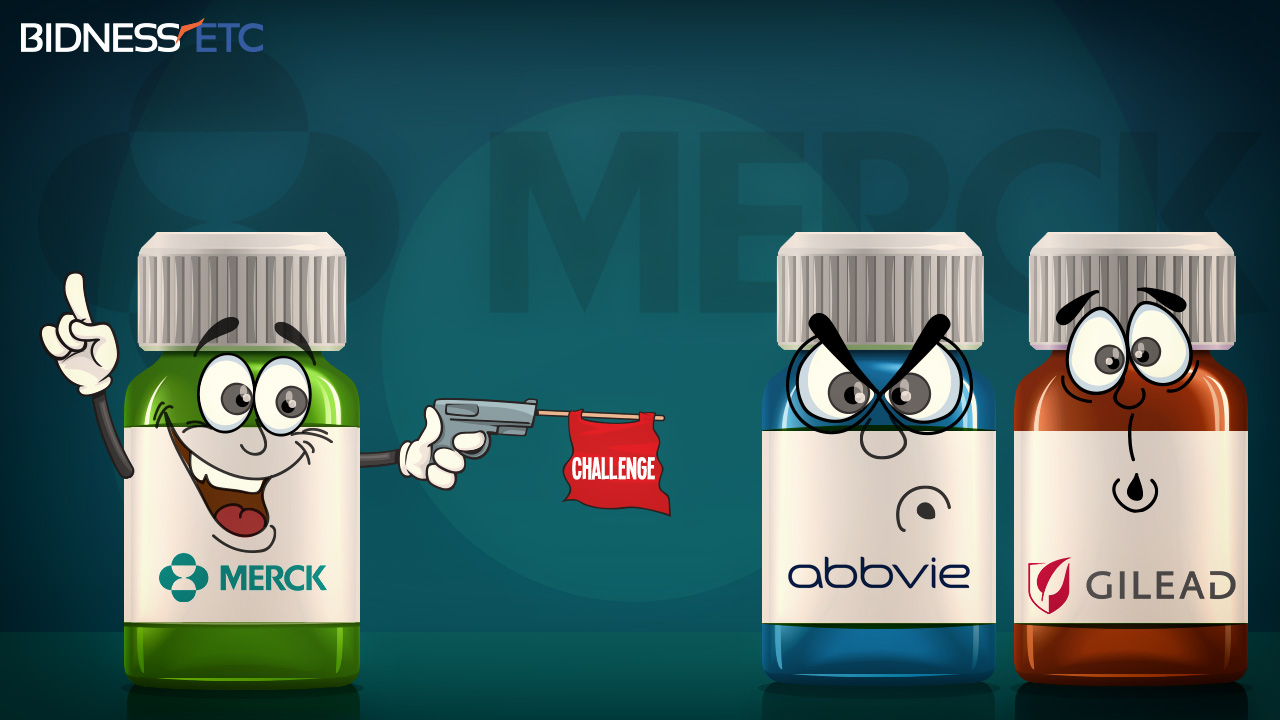
Bidness Etc takes a look at how Merck’s new drug is different from the currently available drugs by Gilead and AbbVie and what analysts think about the competition it can bring to the HCV market
Merck & Co., Inc. (NYSE:MRK) announced Friday that its investigational hepatitis C virus (HCV) combo drug has shown cure rates of 95% among patients who have been untreated earlier. These results from a late-stage clinical trial suggest that Merck, with its combo drug, just might be able to come up as a competitor to Gilead Sciences, Inc. (NASDAQ:GILD), the current leader of the HCV treatment market, and AbbVie Inc. (NYSE:ABBV).
The results of the study demonstrated that the combo drug, which combines grazoprevir and elbasvir, was shown to have cure rates of 92% when administered for the standard duration of 12 weeks. The combo drug was shown to have cure rates of 95% in patients who were suffering from both HCV and HIV, and even higher effective rates in patients who are infected with HCV and have also developed cirrhosis, a condition which hardens the liver and damages the liver functioning.
Merck is evaluating the drug as a potential treatment for the genotypes 1 and 4 subtypes of HCV. Genotype 1 is the most prevalent subtype of HCV in the US, while genotype 4 is more prevalent in Middle Eastern and African regions, such as Egypt. However, according to reports from the National Center for Biotechnology Information, the epidemiology of genotype 4 is changing as it has begun to spread to different European regions, mainly due to injection drug use and immigration.
As many as 150 million people worldwide are known to be infected with the chronic virus, making it a very lucrative market for Merck to tap into.
Merck said that it is scheduled to present the data from this late-stage study during a meeting to be held in Vienna and has plans to submit a New Drug Application (NDA) for the drug to the US Food and Drug Administration (FDA) in the first half of this year.
“Patients with co-morbidities and varying treatment experiences represent important segments of the chronic hepatitis C population in need of additional innovative treatment options,” Eric Lawitz, M.D., medical director of the Texas Liver Institute, said in a statement.
“Co-morbidities” is a term used to refer to patients who are suffering from more than one ailment.
Impact On Gilead
Robyn Karnauskas, an analyst at Deutsche Bank, speculates about how the launch of the drug by Merck will alter the current HCV treatment landscape in the US. The analyst predicts that Gilead’s current market share of 80% this year could go down to only 60% in a matter of two years, if Merck secures approval for its combo drug by mid-2016. The analyst also predicts that AbbVie’s share of the HCV treatment market is to go down to 15% from the current 20%.
Furthermore, Merck will not just be competing in the market by launching a new drug and increasing the number of options available to the patients; the increased number of drugs and players in the market will also give the pharmacy-benefits managers further bargaining power to force the drug-makers to lower the prices of these highly expensive specialty drugs.
Ms. Karnauskas forecasts that the launch of the new drug is likely to result in an increase in the discount rates by as much as 10%.
Gilead’s latest HCV drug, Harvoni, is currently only approved to be used to treat patients with genotype 1 of the virus. However, Merck has received a breakthrough therapy status for its drug as a potential treatment for genotype 4 and the population of genotype 1 patients who also suffers from cirrhosis, giving it an edge over Gilead’s drug. Eliav Barr, vice president of infectious diseases at Merck, said that the company will not restrict its regulatory filings for only these subtypes of HCV; it will also seek approvals for its drug to be used to treat other subgroups as well.
Merck’s drug might also have an edge over Gilead’s drug as it has been shown to be effective in treating the sickest of patients such as the ones who have developed cirrhosis. Another edge that the drug will have over the already approved drugs for the indication is that the duration of treatment with Merck’s combo drug is shorter than the standard treatment time taken by the current treatments; the drug needs to be taken by these patients for four extra weeks, stretching the total course to 16 weeks, without ribavirin.
“Even among the sickest of the sick, we only require 16 weeks of therapy,” Dr. Barr mentioned. “That will be a substantive advantage.”
However, the drugs by Gilead and AbbVie need to be taken for 24 weeks by the sickest of patients. The treatment duration for this group of patients with Gilead’s and AbbVie’s drug can be slashed to 12 weeks if the drugs are administered with ribavirin, which has serious side effects.
However, all analysts do not share the same views about how the drug will impact Gilead’s market share. Yaron Werber, a Citigroup analyst, wrote in a research note that he believes Merck’s new drug is neither a potential threat to Gilead nor to its market share. “We see no edge for Merck here that can threaten Gilead’s regimen,” he said. According to him, Harvoni is still the best drug to be used to treat HCV.
“Overall, Harvoni data looks better,” he said.
He also mentioned in his research note that Merck’s combo drug is still at an inferior level to Gilead’s drugs, claiming that Merck’s drug has lower potency when compared to Gilead’s.
“So while Merck’s data is fine, it is simply not as good,” he wrote.
Gilead stock closed down 1.44% Friday at $103.69. Merck stock, however, gained a marginal 0.16% to close at $57.60.






